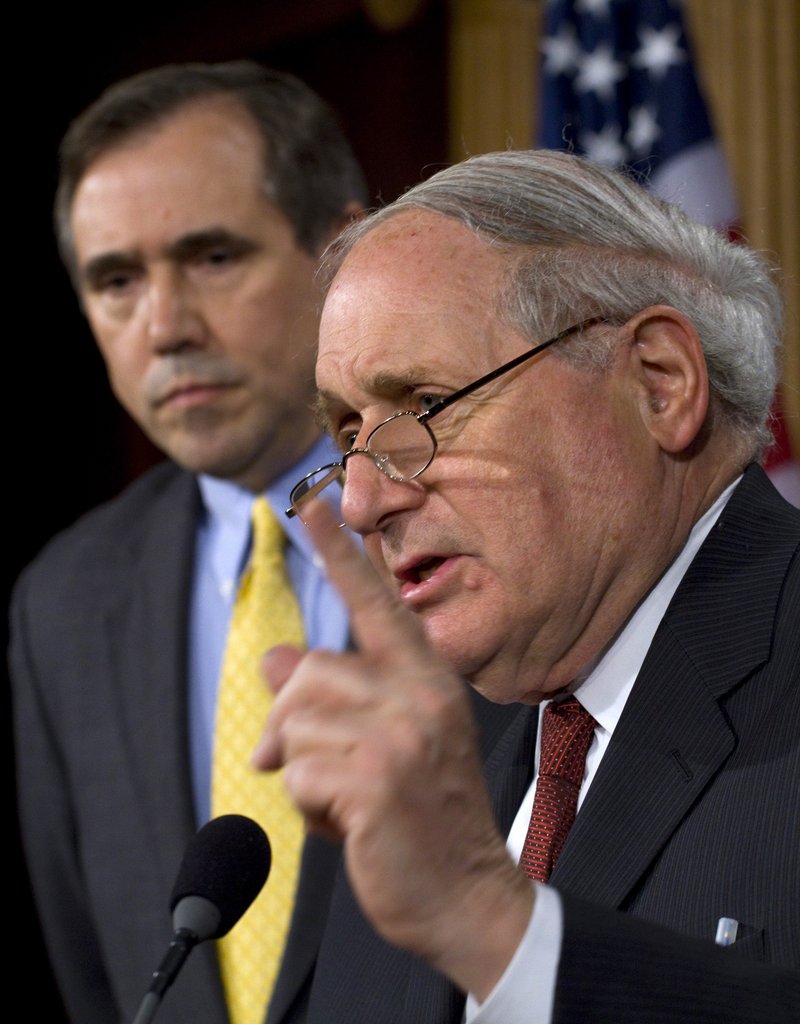WASHINGTON – Sen. Jim DeMint, R-S.C., wants the government to finish building the 700-mile fence between the U.S. and Mexico. Sen. Patrick Leahy, D-Vt., wants to end the health insurance industry’s antitrust protection. West Virginia’s two senators want help with mine and oil rig safety.
They all want to add these things to the financial regulatory overhaul bill moving through the Senate, even though their ideas have little or nothing to do with oversight of financial markets.
Senators have proposed 326 amendments to the bill, which is primarily aimed at revamping the system that’s regulated financial institutions since the Great Depression, but failed to prevent the current deep recession.
The bill could be the last major legislation this Congress approves, and would draw enormous media attention before November’s congressional elections. That’s why it’s attracting a lot of extraneous amendments.
“A lot of senators see this bill as a good forum, and they see the session winding down after this,” said David Arkush, the director of Congress Watch, a watchdog group.
Christopher Dodd, D-Conn., the Senate Banking Committee chairman, saw a darker motive: “This is one way to delay the bill,” he said. Senators expect to vote as soon as today on whether to limit debate and move quickly to a final vote.
Republicans dispute the suggestion that they only want delay. Sen. James Inhofe, R-Okla., for instance, wants to add an amendment that would postpone a new federal rule requiring government certification for contractors who remove lead paint because there aren’t enough courses to train such people.
The amendment isn’t an effort to delay the banking bill, said Inhofe spokesman Matt Dempsey.
Then why attach it to this bill?
“Our ability to raise awareness is more limited as Republicans,” Dempsey said, because the minority party can’t call hearings and doesn’t control what’s taken up on the Senate floor. “You have to look for opportunities,” he said.
Adding extraneous amendments to legislation is hardly unusual, and it’s difficult to know how many of the 326 amendments are directly related to the bill’s purpose. Dodd has fought approval of anything that’s not germane. So far he’s largely succeeded, but he still battles daily: On Monday alone, 15 new amendments were proposed.
Last week, DeMint urged requiring the government to finish the partially completed border fence within a year. It’s a popular idea: The Senate agreed last year to order that the fence be finished by Dec. 31, but the plan went nowhere.
DeMint, one of the Obama administration’s harshest Senate critics, tried to keep his ire nonpartisan. “We’ve now had two administrations fail to keep their promise to the American people to secure our border, and Americans are tired of excuses,” he said.
He tried to attach his proposal to a bipartisan amendment championed by Sen. Ron Wyden, D-Ore., to end the practice of allowing senators to secretly block legislation from reaching the Senate floor.
Sen. Sam Brownback, R-Kan., moved to have the Senate express outrage over how the exploitation and trade of certain minerals in the eastern Democratic Republic of Congo is “contributing to an emergency humanitarian situation” there.
Vermont’s Leahy continues to push for ending the 65-year-old antitrust exemption for health insurers. The House of Representatives passed a repeal earlier this year, but the Senate hasn’t voted, and Leahy sees the financial overhaul bill as a convenient vehicle for his proposal.
One way to get consideration of popular ideas that may not be connected directly to financial regulation is to suggest that there is some relationship.
In West Virginia, where 29 people died in an April mining disaster, the state’s senators, Democrats Robert Byrd and Jay Rockefeller, want publicly traded companies to disclose data about health and safety conditions in risky workplaces such as coal mines and oil rigs. The Securities and Exchange Commission as well as shareholders could seek civil penalties for failure to disclose. The proposal hasn’t come to a vote.
“The amendments deal with the SEC and reporting to investors,” said Jesse Jacobs, Byrd’s spokesman. “Could not think of a better piece of legislation than the financial reform bill to try and add the amendment.”
Some of the other proposed amendments to the financial regulation bill, with their original sponsors in parentheses:
• Prevent senators from secretly blocking legislation from floor consideration (Sen. Ron Wyden, D-Ore.).
• Require companies to disclose payments to foreign countries for oil, natural gas and mineral rights (Sen. Ben Cardin, D-Md.).
• End the practice of “secret spending” by requiring most proposals to be available on a public website well in advance of final congressional action (Sen. Tom Coburn, R-Okla.).
Send questions/comments to the editors.



Success. Please wait for the page to reload. If the page does not reload within 5 seconds, please refresh the page.
Enter your email and password to access comments.
Hi, to comment on stories you must . This profile is in addition to your subscription and website login.
Already have a commenting profile? .
Invalid username/password.
Please check your email to confirm and complete your registration.
Only subscribers are eligible to post comments. Please subscribe or login first for digital access. Here’s why.
Use the form below to reset your password. When you've submitted your account email, we will send an email with a reset code.